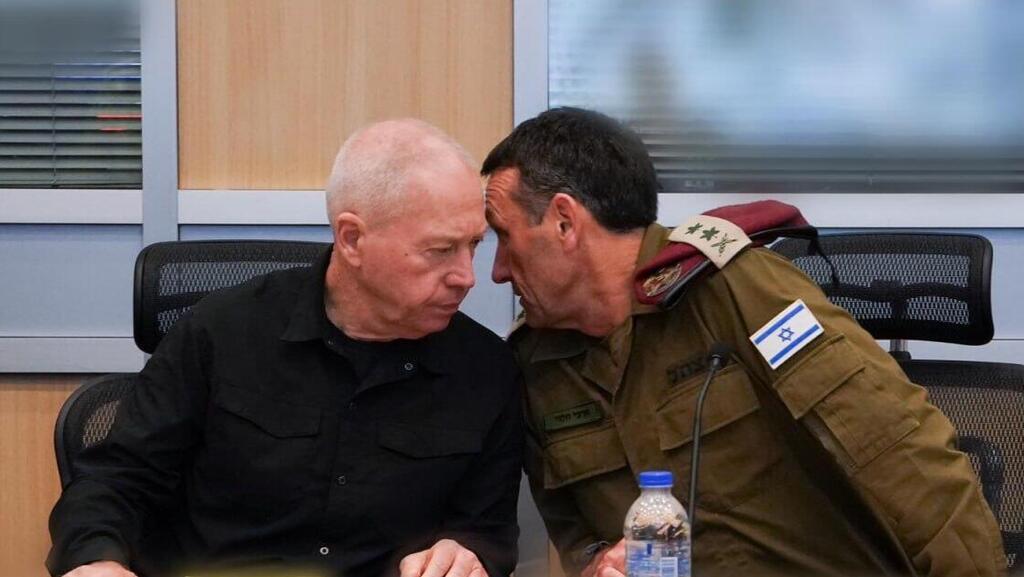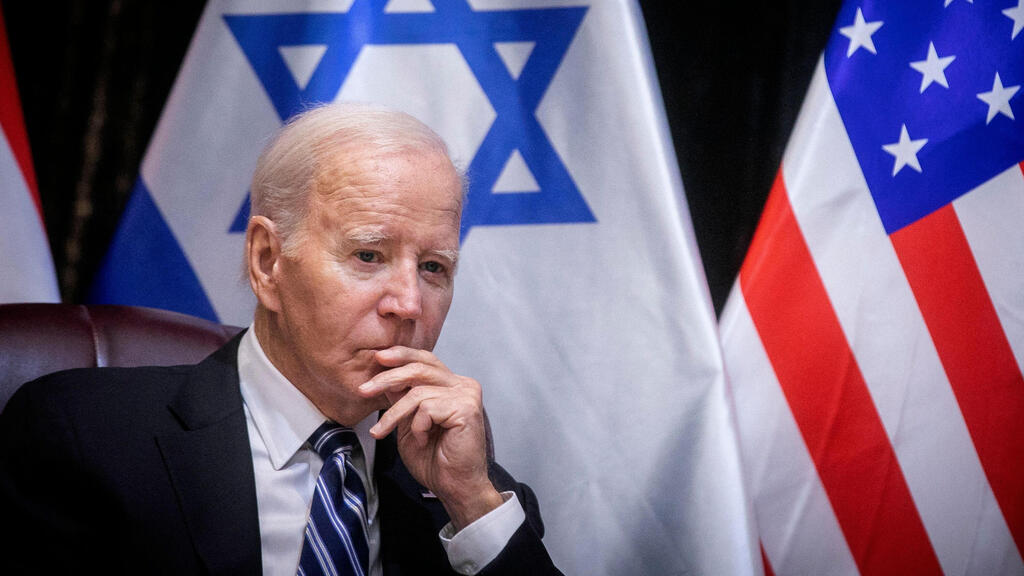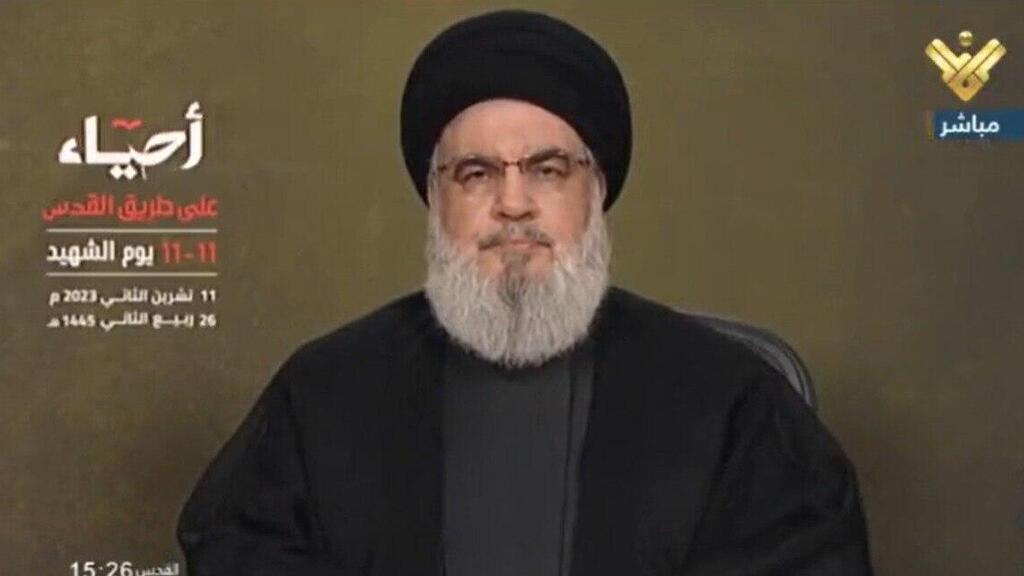At the beginning of the week, it seemed Israel was on the brink of a major escalation in the northern border. On Saturday, Hezbollah leader Hassan Nasrallah significantly increased rocket launches toward Israel used new means and military equipment, and managed to hurt Israelis in attacks that continued on Sunday and Monday.
More stories:
The IDF responded with measured strikes on Hezbollah targets and thwarted terrorist infiltration attempts. It also attacked Hezbollah's infrastructure and facilities in southern Lebanon in precise airstrikes.
The Israeli public feels mostly disappointed with what many perceive as Israel's mild response to Hezbollah, particularly the fact that the IDF has not yet received orders to attack Lebanon and eliminate Hezbollah's threats on the border.
At this stage, Israeli officials intend to focus on the fighting in Gaza and address the northern threat at a later time if necessary. However, this is only part of the picture. Behind the scenes, the U.S. is exerting heavy pressure on Israel not to fight on another front. Washington’s message is clear: don’t go to war with Hezbollah.
Israel’s government and security officials must now grapple with two issues: firstly, what will happen if another significant escalation takes place in the north, with missiles aimed at Haifa and beyond it. The second, more difficult issue is how Israel can create a secure northern border that allows residents of the Lebanon border communities, such as Metula, Kiryat Shemona, and Nahariya, to lead normal lives without fear for their lives.
Israel is mostly ready to deal with the first issue. Should Hezbollah launch a full-scale war or if the security cabinet decides on it, Israel is capable of destroying terror infrastructure, command centers, and Hezbollah's vast missiles and drone arsenal to a tolerable level. Through ground offensives, it can also eliminate the threat from the terror organization’s elite Radwan unit, mortars, and drones directly threatening communities on the northern border.
America holding back
In fact, these plans were close to taking place. According to The New York Times, On October 11, Defense Minister Yoav Gallant and senior IDF officials led by IDF Chief of Staff Lt. Gen. Herzi Halevi, called for a preemptive and powerful strike against Hezbollah in Lebanon.
According to foreign reports, Gallant and Halevi argued that the IDF has been preparing and organizing for active warfare on multiple fronts in the past decade. However, Prime Minister Benjamin Netanyahu rejected the plan and removed it from the agenda during the war cabinet’s discussion.
The main reason for postponing the proposal was an American request to do so. U.S. President Joe Biden’s administration feared that an Israeli attack on Lebanon would ignite a regional war involving Iran, Syria, and Iran's proxies in Yemen and Iraq.
Washington was concerned that a regional war would force the U.S. to actively align with Israel, diverting the attention and resources it needed to manage the war in Ukraine and its global competition with China.
A regional war in the Middle East, Netanyahu and Gallant were told, is the last thing the U.S. wants, and a stream of senior American officials was sent to Israel to ensure it doesn’t deliver a preemptive blow against Hezbollah. It seems that Israel informed the Americans of its intention, and the Washington government scrambled to prevent it.
In exchange for avoiding an attack on Hezbollah, the U.S. offered diverse assistance to Israel, which the Biden administration is currently providing generously. This includes a commitment to help Israel intercept missile attacks from Lebanon should Hezbollah decide to launch a war against the country.
The agreement also extends to intercepting the missiles and drones that both American and Israeli intelligence expect to come from Yemen, Syria, and possibly Iraq in such a scenario. Israel has demonstrated its capabilities in intercepting missile attacks in the war so far. However, the situation may change dramatically if Hezbollah decides to deploy its entire arsenal.
It can be inferred, based on various indications, that Gallant and the Maj. Gen. Halevi regret not being able to carry out the preemptive strike, which, while significantly raising the cost of war for Israel, might have laid the foundation for a new, possibly better, security situation on the Lebanese border.
Gallant and the war cabinet later defined the policy announced by the Defense Minister in a press conference: "Any attack on Israel will cost a heavy price. Israel's commitment to residents of the north is identical to its commitment to residents of the south."
Hezbollah, Lebanon, and Gaza
Some Israeli officials already argue that the IDF's success and significant destruction in Gaza are causing Nasrallah to avoid a more severe escalation on the Israeli border. However, Hezbollah is far from wanting to put down its weapons. Nasrallah is determined to fulfill the role assigned to him by his Iranian patrons aimed at destroying Israel through repeated attacks.
In the ongoing war of attrition that Nasrallah is leading, he’s counting on internal pressure within Israel to build, forcing the country to agree to a ceasefire with Hamas before dismantling it. According to him, Israel struggles to withstand the economic toll caused by the war, and the pressure from families of Israeli captives held in Gaza.
Nasrallah, who follows Israeli media diligently, believes that these pressures will complement the efforts his forces are making against Israel by exhausting it further with rocket, anti-tank missile, and drone attacks.
This is one of the main reasons why Nasrallah is cautious not to cross the point which will lead to an all-out war in the north. Nasrallah, who sees himself first and foremost as Lebanese, presents himself as Lebanon's defender and savior. He‘ll find it very difficult to explain to members of other ethnicities – Christians, Druze, and Sunnis, but also to many Shi'a community members – why their country needs to be attacked only to aid the Palestinians.
Therefore, most rocket launches from Lebanon toward Israel are executed by terrorist forces affiliated with Hamas, while Hezbollah’s fire is reserved for what it considers to be an attack against the Lebanese people.
Nasrallah’s provocation this week led the IDF’s Northern Command to refresh plans for a limited or even full-scale war on the northern border. "We’re prepared and know what to do against any provocation from Hezbollah," a security official said.
Nasrallah seems to take Israel's statements seriously, but there’s another factor that likely works to deter him: the U.S.’s thinly veiled threat that should he expand the war to the northern front, the American military may take steps to help Israel in the fight.
The war cabinet headed by Netanyahu isn’t taking any risks. Although military intelligence estimates indicate that Nasrallah's intentions don’t include a comprehensive war, the IDF is portioning a significant amount of its strength to the northern border.
"Hezbollah's major success is that instead of 70% of the Israeli Air Force attacking in Gaza and 30% being on standby in the northern border, the situation today is the opposite," a security official. said "This is also the case regarding IDF brigades stationed on the Lebanon border. We could use them to shorten the time of operation in Gaza."






